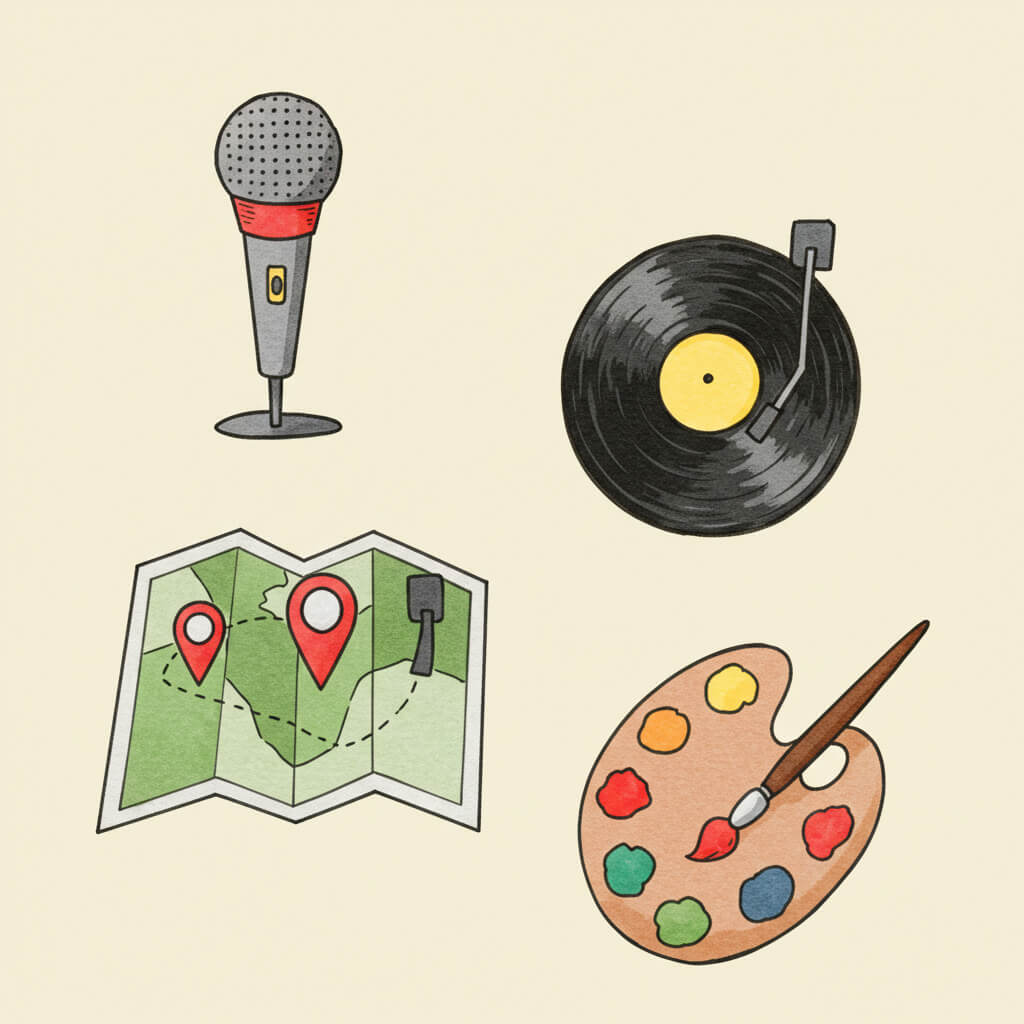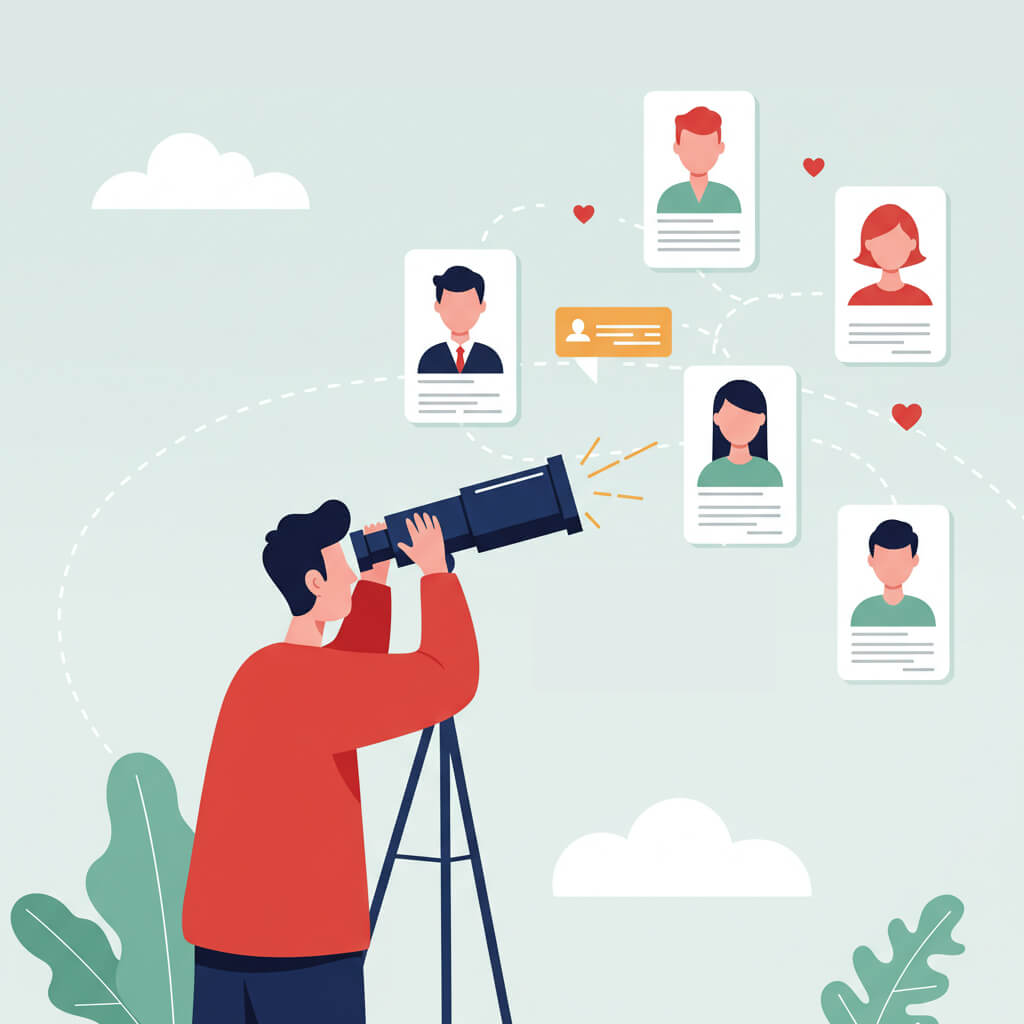For years, the rule of thumb was clear: hobbies don't belong on a resume. The idea was to keep things professional, focused, and concise. After all, why would one waste precious resume space on hobbies and interests when you could be bringing a recruiter's attention to your skills and achievements?
But that thinking is starting to shift.
Recruiters often spend just seconds (7, to be precise) scanning a resume, and sometimes, it's the small human detail - a mention of marathon running, community theater, or language learning - that can make a profile feel memorable or relatable. Done right, hobbies can reveal soft skills, show passion, or spark a conversation. For early-career professionals or career changers, hobbies can also help fill in gaps or add dimension beyond formal work experience.
Let's be clear: hobbies are never the most important part of your resume. They won't get you the job on their own. But when chosen carefully and positioned strategically, they can reinforce your strengths and help your application stand out in subtle but meaningful ways.
In this guide, we'll explore how to decide whether to include hobbies on your resume, which ones actually add value, which ones should be avoided, and how to present them effectively. The goal is to learn to strike a balance between professionalism and personality because a resume is no longer just a list of your qualifications but a snapshot of who you are. And sometimes, that includes what you love to do.
Should you put hobbies on a resume? The golden rule
Hobbies for resume aren’t a must, unlike your skills summary or measurable accomplishments. And like most optional choices in resume writing, it depends on your goals, industry, and how much space you have to work with.

So, when is it appropriate to include hobbies and interests in a resume? A good rule of thumb: if they reinforce your fit for the role or provide the reader with insight into your personality that’s relevant to the job, go for it. This is especially true for:
- Entry-level candidates who may not have extensive work experience yet and want to show soft skills, drive, or unique qualities.
- Creative fields such as marketing, media, design, or content creation, where personal flair can be part of your professional appeal.
- People- and culture-driven industries, such as education, hospitality, or nonprofits, where shared values and personality can significantly influence hiring decisions.
- Startups and small companies, where team chemistry and a cultural match are often just as important as your qualifications.
There are times when hobbies may not be necessary, though, or may even distract from your professional story.
For instance, in highly technical or specialized roles like software engineering, data science, or finance, employers are typically more focused on skills, certifications, and outcomes. If space is tight, your resume real estate is usually better used for detailing relevant experience or quantifiable achievements.
The same applies to senior or executive-level candidates. At that level, your leadership accomplishments and strategic impact tend to carry more weight than your interests - unless your hobby directly supports your personal brand (e.g., speaking engagements, nonprofit board roles, etc.).
The key is to be intentional. Don’t include hobbies just to fill space or try to seem “well-rounded.” Include them because they add something meaningful.
The psychology of hobbies: What recruiters might read into yours
Most recruiters won’t spend more than a few seconds looking at the “Hobbies” or “Interests” section of your resume, but that doesn’t mean it goes unnoticed. In fact, those few words can trigger unconscious assumptions about who you are beyond your credentials.

That’s because hobbies often serve as personality signals. Whether you’re aware of it or not, your choice of interests can hint at your soft skills, mindset, and even your working style - all of which matter when hiring managers are looking for the right fit.
Here are a few examples of what your hobbies might be saying about you:
✅ Chess suggests patience, critical thinking, and the ability to plan several steps ahead - all traits valuable in strategy-heavy roles like consulting or data analysis.
✅ Distance running/triathlons often imply discipline, endurance, and a long-game mentality - qualities prized in fields like sales, project management, or entrepreneurship.
✅ Improv comedy/theater/public speaking may indicate strong communication skills, adaptability, and confidence in fast-moving environments.
✅ Blogging/creative writing/podcasting can highlight storytelling ability, digital fluency, and self-direction, which is especially valuable in marketing or media roles.
✅ Volunteering/mentoring shows empathy, leadership, and a desire to give back. These can resonate strongly in the education, nonprofit, or healthcare sectors.
Of course, these aren’t hard rules. Just because someone loves hiking doesn’t automatically make them a tenacious problem-solver. But recruiters are human, and humans are wired to make quick associations. A well-chosen hobby can subtly reinforce your strengths or offer a glimpse of a personality that makes you more memorable.
On the flip side, some hobbies can raise eyebrows, even if unintentionally. Interests that are too obscure (e.g., “historical pipe restoration”), highly solitary, or culturally specific might confuse or alienate some readers. That doesn’t mean you should hide who you are, but it does mean being mindful of your audience.
Even something as harmless as “watching Netflix” might come across as passive or generic unless paired with a deeper interest, such as film critique or storytelling. Overly edgy or controversial hobbies (like competitive shooting or political activism) might trigger bias unless they’re directly relevant to the job or organization. Ultimately, the psychology of hobbies on a resume isn’t about playing it safe. It’s about using every inch of space to reinforce your fit and present a well-rounded, self-aware candidate.
List of great hobbies to include on a resume (+ what they say about you)

The best hobbies to include on a resume are strategic and relevant. The key is to highlight interests that subtly reinforce the soft skills employers value most: communication, collaboration, resilience, creativity, empathy, and analytical thinking. Below is a tentative breakdown of hobby categories, including popular examples, their intended message, and when they might be suitable to include.
- Leadership & teamwork
These hobbies demonstrate collaboration, coordination, and the ability to lead or support a group effort - all key traits in almost any work environment.
- Team sports (soccer, basketball, volleyball): Shows that you understand shared goals, can effectively communicate under pressure, and support your teammates.
- Volunteering: Reflects a sense of responsibility, initiative, and care for others, which serves as a strong signal for nonprofit or community-facing roles.
- Event organizing (school clubs, fundraisers, conferences): Suggests planning, multitasking, logistics, and leadership experience.
- Scouting (e.g., Eagle Scout, Girl Scout Gold Award): Highlights long-term commitment, community involvement, and leadership development.
- Toastmasters or public speaking groups: Demonstrates courage, leadership, and communication skills in action.
✅ Best for roles involving collaboration, leadership, client interaction, or community engagement.
- Creativity & communication
These hobbies demonstrate your ability to think creatively, express yourself, and communicate effectively. They are essential in marketing, writing, and creative industries.
- Blogging or content writing: Signals self-discipline, storytelling, and written communication.
- Podcasting or YouTube content creation: Highlights digital literacy, public speaking, and audience awareness.
- Photography or videography: Shows artistic eye, attention to detail, and visual communication.
- Creative writing (fiction, poetry, essays): Demonstrates imagination, emotional intelligence, and clarity of thought.
- Graphic design or digital art: Ties well with UX/UI, branding, and design-related roles.
✅ Best for marketing, design, education, communications, media, and product roles where messaging and creativity matter.
- Discipline & endurance
Hobbies in this group speak to your drive, resilience, and ability to stick with goals over time. They often reflect a mindset of improvement, effort, and mental toughness.
- Long-distance running, cycling, or swimming: Suggests perseverance, focus, and a growth mindset - especially valued in roles that require persistence or stress management.
- Martial arts (karate, jiu-jitsu, taekwondo): Indicates discipline, self-regulation, and confidence.
- Weightlifting or bodybuilding: Shows goal-setting, structure, and self-motivation.
- Chess or strategic board games: Communicates critical thinking, long-term planning, and mental discipline.
- Yoga or meditation: Signals self-awareness, emotional regulation, and a balanced approach to stress.
✅ Best for sales, operations, consulting, and any role where self-motivation and stamina are crucial.
- Technical & analytical thinking
These hobbies are ideal for candidates in STEM or tech-adjacent fields, where logic, structure, and problem-solving take center stage.
- Coding or side projects (web apps, automation tools): Shows initiative, learning ability, and real-world application of technical skills.
- DIY electronics, Arduino, or Raspberry Pi projects: Reflects hands-on tech curiosity and innovation.
- Puzzle-solving (crosswords, logic puzzles, escape rooms): Suggests problem-solving, analytical thinking, and detail orientation.
- Gaming (strategy or simulation games, such as Civilization, Factorio, or Dota): While often misunderstood, strategic gaming can reflect quick thinking, pattern recognition, and adaptability.
- Fantasy sports leagues: Indicates research skills, data interpretation, and strategy, especially if you’ve run a league or written about it.
✅ Best for engineering, IT, analytics, data science, cybersecurity, and problem-solving-heavy roles.
- Empathy & people skills
These hobbies show emotional intelligence, social awareness, and the ability to connect with others. They are a major asset in roles that rely on trust, teamwork, and relationship-building.
- Mentoring or tutoring: Indicates patience, listening skills, and a willingness to invest in others' growth.
- Parenting (when framed carefully): Highlights multitasking, time management, conflict resolution, and empathy.
- Language learning: Demonstrates curiosity, adaptability, and cross-cultural sensitivity - all great for global teams.
- Community organizing or activism: Suggests conviction, communication, and leadership rooted in values.
- Performing arts (theater, dance, music): Reflects emotional expression, confidence, and collaboration.
- Animal rescue or fostering pets: Shows compassion, responsibility, and follow-through.
✅ Best for HR, healthcare, customer service, teaching, counseling, and team-based environments.
How to choose the right hobby to include
When deciding which hobbies to include on your resume, ask yourself:
- Does this hobby reinforce a trait that’s relevant to the job?
- Could this hobby spark a positive connection with a recruiter?
- Is it something I’d be comfortable discussing in an interview?
You don’t need to list everything you enjoy; only add the ones that add strategic value or reflect the best version of who you are professionally. And, of course, never lie about your hobbies.
Hobbies that might hurt your chances (and why)
While hobbies and interests can add depth to your resume, they’re not without risk. Just as the right interest can strengthen your application, the wrong one - or even the right one presented poorly - can raise red flags or distract from your strengths. That’s why including hobbies should always be a curated decision, not a personal info dump.
Here are three categories of hobbies that had better be kept off your resume:
Controversial topics. Hobbies tied to politics, religion, or divisive social issues can unintentionally alienate a recruiter, even if you list them with good intentions. For example, “political organizing,” “evangelical ministry,” or “pro-gun hunting clubs” might reflect your passion or values, but they can also prompt bias (conscious or not). Unless these are directly relevant to the job or company culture, it’s usually safer to leave them off.
Overly niche or solitary hobbies. Listing something like “coin cataloging,” “bird taxidermy,” or “studying ancient Sumerian linguistics” might make you stand out, but not necessarily in the way you want. These kinds of interests may be fascinating in the right context, but without explanation, they risk making you seem out of touch, overly introverted, or simply not relatable.
Generic (filler) hobbies that say little about you. Think: “watching TV,” “reading books,” or “scrolling TikTok.” These might be honest, but they don’t contribute to your professional narrative and can make it seem like you’re listing hobbies just to fill space.
At its core, your resume is a marketing document - not your dating profile or personal blog. That doesn’t mean you should hide who you are, but it does mean being thoughtful about what you choose to share. A well-chosen hobby can highlight your soft skills, showcase passion, or help you connect with a hiring manager. A poorly chosen one can confuse, distract, or unintentionally create distance.
How to List Hobbies on a Resume (with Formatting Examples)
So, you've decided your hobbies deserve a place on your resume. Great! Now comes the question: where should they go, and how should you phrase them?
Like everything else in resume writing, the goal is to keep it clean and purposeful.
- Where to put hobbies on your resume
The most common and appropriate place for hobbies is at the very bottom of your resume. This helps ensure that they act as a light, humanizing touch rather than a focal point.
For entry-level candidates or career changers, hobbies can also be placed beneath your "Skills" section, especially if they reflect transferable qualities. If your resume has extra space and you're applying for a creative or people-oriented role, consider giving your hobbies a standalone section with a clear heading.
- What to call the section
There's no single "correct" label. Choose a heading that fits your resume tone and the types of hobbies you're including. Here are a few clean, professional options:
Interests
Personal Interests
Passions
Outside Work
Personal Projects
Beyond the Office
Whatever you choose, keep the section title short and avoid overly personal language like "My Favorite Things" or "About Me."
- How to phrase your hobbies
This is where most people go wrong. A vague or lazy list won't do you any favors. Compare:
Bad: "Reading, watching Netflix, hanging out with friends"
Better: “Creative nonfiction writing | Language learning | Long-distance running”
The improved version is: more specific (what kind of reading or writing?), action-oriented (shows ongoing involvement or personal growth), and professionally framed (no slang, no filler).
Use a clean, horizontal format with separators like pipes (|) or commas for readability. Keep it to one line and avoid listing more than 3–5 hobbies. The goal is to highlight your personality, not overwhelm the reader.
- Tailoring matters
Even your hobbies should align with the role you're targeting. For example, a candidate applying for a marketing job might highlight podcast production, while someone applying to a nonprofit might include community volunteering. If a hobby demonstrates a transferable skill or cultural fit, it's worth including. If it doesn't? Save it for small talk during the interview.
Listing hobbies is optional, but if you choose to include them - be intentional. A little personality goes a long way, especially when your resume is one of dozens (if not hundreds) on a hiring manager's desk.
Hobbies on executive and professional resumes: Yes or no?
For senior professionals, listing hobbies on a resume is rarely essential. But in the right context, it can add depth and even strategic value to the application.
Your executive-level resume is expected to focus on leadership impact, business outcomes, and strategic vision. Hiring decisions are often made based on your ability to drive growth, lead teams, and manage change. Your interests outside of work do not carry as much weight. That's why, in most cases, our writers at Resumeble discourage adding hobbies to a C-suite resume.
But there are exceptions, and when used thoughtfully, hobbies can help humanize a high-level candidate and offer insight into their character. This is relevant for roles that involve public visibility, client relationships, or cultural alignment, such as consulting, advisory positions, board seats, or executive roles at mission-driven organizations.
Take a CEO who mentors tech startups in their spare time. That detail can subtly highlight thought leadership, a passion for innovation, and community involvement. Or a CFO who is into competitive rowing. This speaks volumes about discipline and focus.

As with everything else on your resume, make your hobbies intentional and relevant to your career goals. An executive resume, by nature, will be quite long, so avoid listing casual pastimes that don't support your professional image just to fill the space. Look for an overlap between your interests and the leadership qualities you want to project.
Final thought: Be human, but strategic
Hobbies on a resume may seem like a small detail. When done right, though, they can strengthen your application in subtle ways and help you stand out among dozens of equally qualified candidates.
Still, not every resume needs a hobbies section, and including one should never feel like an afterthought.
Here are a few final do’s and don’ts to guide your decision:
✅ Do:
- Include hobbies that reinforce soft skills or traits relevant to the role.
- Use specific, meaningful language (e.g., “creative nonfiction writing” instead of just “reading”).
- Format the section clearly and keep it short - 3–5 hobbies are plenty.
- Consider your audience and how your interests might align with the company culture.
❌ Don’t:
- List hobbies just to fill space or make yourself seem more “well-rounded.”
- Include anything overly controversial, overly generic, or hard to interpret without context.
- Overload your resume with too much personal information - this is still a professional document.
The main rule? Authenticity + relevance = impact. A hobby that reflects who you are and supports your professional story can be a powerful addition. But a vague or poorly chosen list can do more harm than good, or simply waste valuable space that could be used to highlight your achievements.
Whether you’re applying for your first job or updating your resume for an executive-level role, the key is intentionality. Every word on your resume should have a purpose — even the hobbies. It’s about striking the right balance between showing what you can do and who you are.
Need help balancing professional polish with personality? Let Resumeble’s expert writers help you decide what to keep, cut, and showcase, so your resume works for both the algorithm and the human on the other side of the screen.
